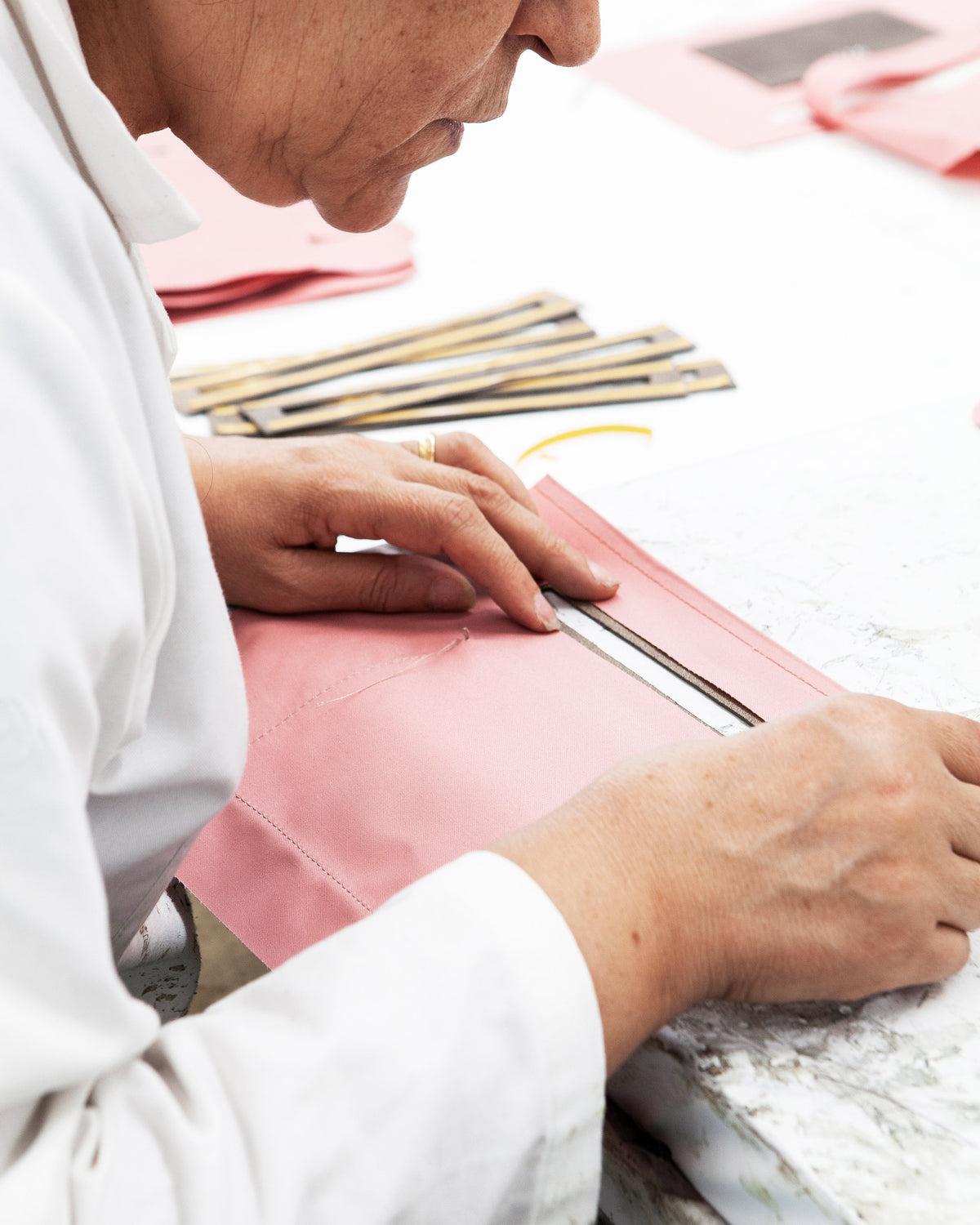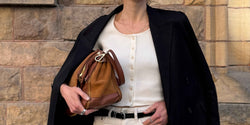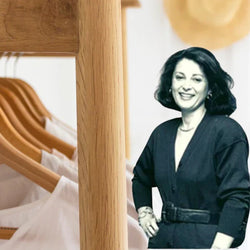

Ethical leather production? What is this?
Ethical leather production has become an increasingly important consideration for those of us looking to buy e.g. a bag. We all know of it, but what does it mean? As our society becomes more aware of the environmental and social impacts of our choices, the fashion industry has faced heightened scrutiny. In particular, the leather production sector has come under the spotlight for its impact on both the environment and the workers involved. This is a subject close to our hearts here at Bukvy. We want to give you a multifunctional, practical, everyday bag, but we do not want to exploit the people making it and try to leave as little footprint as possible on the environment.
What is the problem with leather production and how do we live up to our promises of giving you an ethically produced bag? Come along for an introduction to ethical fashion production by Bukvy.
What is the problem?
Leather, a versatile and durable material, has always been used by humans to create clothing, accessories, and various other products. The problem with leather production lies in its impact on the environment, unethical treatment of workers, and harmful practices such as excessive chemical usage, water wastage, and animal exploitation. These issues have lead to a debate about transforming the industry towards ethical and sustainable practices that respect the environment, workers' rights, and animal welfare.
In recent years, it is no surprise that more and more consumers have started to demand more transparency and accountability in the leather production process, leading to the emergence of ethical fashion production practices. One of these aspects are fair working conditions.

What Are Fair Working Conditions?
Fair working conditions encompass a range of factors that contribute to the overall status and health of workers in the leather industry. These conditions include fair wages, reasonable working hours, safe and hygienic working environments, and respect for workers' rights, such as the freedom to form unions. In other words, freedoms and right that many of us have. Fair working conditions also involve ensuring that workers are treated with dignity and respect, free from discrimination and harassment. In short, working conditions that are humane and in line with what you would expect yourself.
"As we believe, and want, our Bukvy community to become more conscious of the impact of their purchases, we expect the demand for ethical fashion production practices to grow."
The leather industry is notorious for poor working conditions in many parts of the world, with reports of low wages, long hours, unsafe workplaces, and child labor. Within the doctrine of ethical fashion production, the aim is to address these issues by promoting fair working conditions throughout the leather supply chain. For small producers, such as Bukvy, this can be easier said than done. One key component is supplier transparency and accountability, but we will get back to that later.
We will start our journey towards ethical leather production at Bukvy, with a short introduction to what exactly that means.
Fair Wages in Leather Production
One of the key components of fair working conditions is ensuring that workers receive fair wages. In many leather-producing regions, workers are paid meager salaries that do not provide a decent standard of living. This often leads to exploitation and poverty among the workforce.
A fair wage is considered to be one that allow workers to support themselves and their families. By paying workers a living wage, the industry can help uplift entire communities and break the cycle of poverty that has plagued many leather-producing regions.
Reasonable Working Hours
Long and exhausting working hours are common in the leather industry, where workers are often forced to work overtime without proper compensation. Reasonable working hours respect workers' physical and mental well-being. A reasonable working hour promotes a healthier workforce, but also reduces the risk of accidents and injuries caused by exhaustion.
Safe and Hygienic Working Environments
Unsafe and unsanitary working conditions are prevalent in many leather factories. Workers are exposed to hazardous chemicals and substances without adequate protective measures. Needless to say, an ethical approach to fashion production would prioritize the creation of safe and hygienic working environments that minimize health risks and protect workers from harm.
Respect for Workers' Rights
Workers in the leather industry often lack job security and are denied their basic rights. Some of these basic rights include the freedom to form unions and advocate for their interests collectively. This empowers workers to negotiate for better conditions and ensures that their voices are heard. Not having the freedom to do so can be argued constitutes as unethical.
Child Labor and Exploitation
One of the most troubling aspects of the leather industry is the use of child labor and exploitative practices. Many children are forced into hazardous work environments, denying them access to education and a healthy childhood. A good measurement here is to consider what you would want for your own child. This is often considered a complicated topic, as the earning an income is not restricted to only adults in some countries. Nevertheless, an ethical approach would entail working for letting children go to school, not to work.
Dignity and Respect
In addition to the tangible aspects of fair working conditions, treating workers with dignity and respect is at the heart of an ethical approach to production. This includes creating a workplace culture that is free from discrimination, harassment, and exploitation. That is, a decent workplace.

Reducing Environmental Impact
Leather manufacturing can have a significant ecological footprint due to the use of chemicals, water, and energy. All types of production have an impact on the environment, but producers can aim to reduce this impact by making aware and responsible choices. Reducing the environmental impact includes using tanning processes that minimize chemical usage and water consumption. Furthermore, minimizing waste and pollution throughout the supply chain is crucial.
Responsible Sourcing of Raw Materials
The leather industry relies on animal hides as its primary raw material and these needs to be responsibly sourced. This involves ensuring that the animals are treated humanely, with attention to their welfare. Transparency in the sourcing process, allows consumers to make informed choices about the products they purchase.
So where do we stand?
Fair working conditions, along with a commitment to environmental sustainability, are essential elements of a transformation towards ethical leather production. By prioritizing the well-being of workers and the planet, ethical fashion production aims to create a brighter future for the leather industry—one that respects human rights, protects the environment, and offers consumers a more ethical choice. Large words, yes. Difficult? Absolutely! So what does this mean for Bukvy?
As we believe, and want, our Bukvy community to become more conscious of the impact of their purchases, we expect the demand for ethical fashion production practices to grow. For us that means working with trusted, and verified suppliers, ensuring transparency and keeping up with any changes to our suppliers methods and conditions. In order to do this we work with trusted suppliers that promote transparency.

Bukvy values
Our Bukvy products are produced in Portugal and Spain. When deciding where to produce, it was crucial for us to find a supplier that could meet our specifications, but doing so ethically and with as little environmental impact as possible. In addition, we wanted a supplier that could provide us with information and transparency.
The leather used for making your Bukvy is European sourced only, meaning that we know that the animals have lived and been handled according to EU standards. Think about it, this is not true for most leather products you see in stores. Often, the leather has been sourced and produced in places with little or no regulation on production practices. This will surely give you a price-effective bag, but at what cost?
The good people making your Bukvy work under fair working conditions and for a fair pay. This means no sweatshop hours, and a salary to live on. They are given the freedom to organize, the chance to advance at work and making bonuses.
Think about it, this is not true for most leather products you see in stores. Often, the leather has been sourced and produced in places with little or no regulation on production practices. This will surely give you a price-effective bag, but at what cost?
How do we know this? Well, apart from visiting the factories often, we track our manufacturers according to the ILO standards on occupational safety and health. The ILO standard is a tool for ensuring sound prevention, reporting and inspection practices and to provide maximum safety at work.
As a consequence, we know that the people who make your Bukvy:
-
Are not being forced to work
- Are not children
- Have not been discriminated
- Have a safe working environment
- Have decent working hours
- Are being offered education on human rights & worker's right as well as professional eduaction.
-
Have the right and freedom of association and collective bargaining
In addition, we know that your Bukvy is made by people who receive minimum wage or more and have the possibility to earn merits and be considered for bonuses.
Lastly, we know that the manufacturers have an internal complaint system in place for the workers. That means that the workers are able to report an issue and make their voices heard.
To ethically produce leather goods requires hard work throughout the supply chain and much can be improved. We believe that having the mindset and objective to really try to do so at the core of our business will get us a long way.
Those are Bukvy values to us!
To learn more about ethical fasion production that we at Bukvy follow and aim for, visit these pages:
ILO- The International Labour Organization
Så tillverkas läder- Naturskyddsföreningen
Regler och lagar för varor av textil och läder- Kemikalieinspektionen




